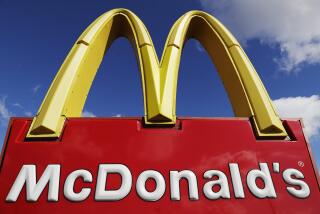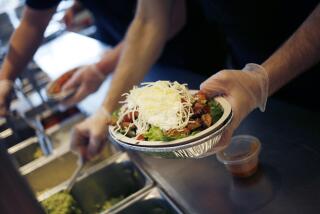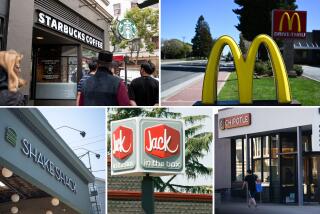A Big Mac, Large Fries and No Smoke : Health: McDonald’s move to banish cigarettes in company-owned eateries could ignite an industry trend.
- Share via
Smoking at most fast-food restaurants may be on the brink of extinction as the result of a surprise move Wednesday by industry kingpin McDonald’s to snuff out smoking at its company-owned outlets.
McDonald’s Corp., bowing in large part to pressure from consumer groups, said it will immediately begin to ban smoking at all of its 1,400 company-owned restaurants. Company officials say it may take several weeks to put the policy into practice while no-smoking signs are shipped to the eateries.
The move by McDonald’s, the world’s largest fast-food chain, is expected to pressure the bulk of McDonald’s franchisees to also ban smoking. About 2,200 McDonald’s franchise restaurants are already smoke-free, bringing the company’s total of nonsmoking establishments to more than 3,600 of its 9,100 restaurants nationwide.
The move will not affect McDonald’s outlets in the city of Los Angeles, where a municipal smoking ban has been in effect at all restaurants since August.
The action came a day ahead of what is expected to be a blistering report from the U.S. surgeon general on the hazards of secondhand smoke. It also took place on the same day that the state unveiled a tough-talking, anti-smoking ad campaign blasting tobacco ads it says are aimed at teen-agers.
With its move, McDonald’s--which previously won consumer applause for eliminating the use of plastic foam containers--is almost certain to generate a public relations windfall.
“It’s a shrewd marketing move,” said Scott Allmendinger, editor of Restaurant Business magazine. “McDonald’s looks like it’s out on front on this issue. And that’s all that matters.”
Although McDonald’s is not the first chain to ban smoking, it typically sets the fast-food industry standards, and industry consultants say it may be only a matter of months before most of the fast-food chains fall into line.
Two years ago, Chuck E. Cheese and Carl’s Jr. restaurants banned smoking in their company-owned eateries. Earlier this year, Arby’s and Dairy Queen also announced plans to eliminate smoking at units owned by the company.
While Burger King and Wendy’s say they have tested no-smoking policies at some units, neither company was willing to commit to the policy on Wednesday.
Fast-food chains have increasingly been feeling the heat from consumer groups and legislatures. Last week, for example, Texas Atty. Gen. Dan Morales filed lawsuits against McDonald’s and four other fast-food chains, alleging that secondhand smoke in their restaurants jeopardized the health of children.
*
What’s more, the Environmental Protection Agency reported last year that secondhand smoke kills 3,000 nonsmokers a year through lung cancer and is responsible for up to 300,000 cases of bronchitis and pneumonia in children.
At a Washington news conference Wednesday, key fast-food industry officials appeared with Rep. Henry Waxman (D-Los Angeles) to support his bill to eliminate smoking in all public places. The National Council of Chain Restaurants, whose members include such fast-food powers as McDonald’s, Burger King, Wendy’s and Taco Bell, announced their support of the Smoke-Free Environment Act of 1993.
It’s too soon to fully gauge consumers’ response to the move, but one McDonald’s customer, who is a smoker, said the new policy is fine with him.
“It doesn’t bother me,” said Keith Perkins, a liquor truck driver from Garden Grove, who stopped late Wednesday afternoon for a hamburger and coffee at a McDonald’s in Costa Mesa. “I know other restaurants are going to do it sooner or later.”
A franchise owner of six McDonald’s restaurants in Southern California said he has already banned smoking at four of them after suggestions from his customers. In particular, McDonald’s that have children’s play areas typically attract more children, “and those parents tend be a little more sensitive about smoking customers,” said Dana Crandall, director of operations for Man-Cal Inc. in Santa Ana.
But the move to ban smoking could also have some negative repercussions. While smokers make up only about one-quarter of the U.S. population, smokers typically make more visits to fast-food restaurants than do nonsmokers, according to a recent survey by the marketing research firm Simmons Research.
“McDonald’s isn’t taking a shot at the tobacco industry,” said Brennan Dawson, a spokeswoman for the Tobacco Institute, an industry trade group. “They’re taking a shot at a large percentage of their customer base that smokes.”
But while the no-smoking rules could irk some customers, it may actually boost business at fast-food restaurants that adopt the policy, said Jack Bernstein, president of the Manhattan Beach consulting firm Restaurant Marketing Assn.
*
“Keep in mind, more than 75% of Americans don’t smoke,” Bernstein said. “I guarantee you, McDonald’s will soon be running advertising that brags that they are smoke-free.”
Anti-smoking activists claimed victory Wednesday.
“Each time a fast-food chain changes its smoking policy, it makes it that much harder for the others to keep theirs in force,” said John F. Banzhaf, executive director of Action on Smoking and Health. “If some kid has an asthma attack in a fast-food joint that allows smoking, how is the restaurant going to defend itself?”
Times staff writer Richard Core in Orange County contributed to this report.
More to Read
Inside the business of entertainment
The Wide Shot brings you news, analysis and insights on everything from streaming wars to production — and what it all means for the future.
You may occasionally receive promotional content from the Los Angeles Times.










